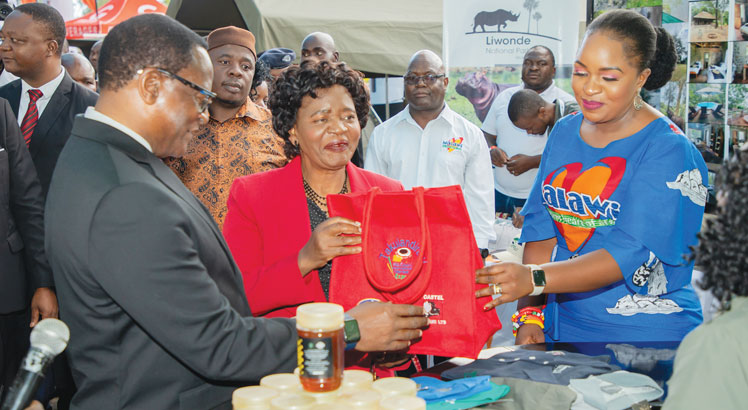Transforming tourism and culture
Tourism is one of Malawi’s fastest growing sources of foreign exchange earnings.
The country has numerous underexplored natural stunners and diverse culture, coupled with a melting pot of more than 30 ethnic groups and languages that beckon visitors to “the Warm Heart of Africa”.
The warm greetings, thrilling dances , mesmerising music, freedom of worship and enriching traditions, the wide-ranging culture could be the next big allure on offer.
Minister of Tourism Vera Kamtukule says Malawians’ unique way of life is worth every explorer’s eye.
She states: “Malawi, the warm heart of Africa, is known for its spectacular scenery, rich cultural diversity and friendly people.
“Here, visitors freely engage with locals , participating in cultural events and immersing themselves in the country’s cultural wealth without any threats.”
Recently, the ministry’s annual Malawi International Tourism Expo, tagged Takulandirani (welcome), showcased the country’s bragging rights.
The two-day event, opened by President Lazarus Chakwera in Lilongwe, brought together policymakers, service providers, experts and potential tourists. It creates an opportunity for various players to share Malawi’s cultural heritage and tourism potential with the world.

“Such events promote networking between the international buyers and local tourism service providers. This strengthens business partnerships to sell Malawi tourism products on the international markets,” explains Kamtukule.
The ministry is also engaging go -to communities with unique cultural heritage and natural attractions to improve mutually beneficial ties with tourism-based businesses.
Tourism is among the enablers of the Malawi 2063 long-term socio-economic vision.
This dial s up the importance of the 20- year National Tourism Investment Master Plan, which outlines priority investments by government and the private sector to transform the country’s tourism sector.
Recently, Kamtukule visited Mzuzu University (Mzuni), where she commended its faculty of tourism’s contribution to the sector’s growth and diversity.
The minister reiterated government’s commitment and support to the fast-rising “hub for skills development in the tourism sector”.
Emmanuel Banda, head of faculty, says Mzuni will not relent producing skilled workers to help the country
harness its natural beauty, cultural heritage, peace and unity to increase the international demand and foreign earnings.
“The faculty acts as an advisory body to the tourism industry through consultancies,” he says. “It is also helping boost the industry through knowledge generation and human capital development,” he said.
Banda urges government to provide an enabling environment for the academia to produce a workforce with relevant skills for tourism development.
“This calls for adequate financing and relevant policies that provide conducive environment and incentives,” he says.
US tourist Michael Elsie says Malawi is blessed with numerous historical sites, natural attractions and cultural villages likely to attract tourists if supported.
“A good example is the historical Stone House at Livingstonia in Rumphi and the ancient religious shrine of Mbona at Khuluvi in Nsanje,” he explains.
The traveller urged government to aggressively market its limitless beauties, including the palm-fringed Lake Malawi—the country’s most-visited attraction, while promoting museums, antiquities and other sites “that tell the story of the
people and cultures of Malawi.”
“Many tourists from overseas are looking for well-developed beaches where they can relax in the tanning sun. With a long shoreline, Malawi is blessed with one of the longest beaches in southern Africa,” he states.
Some tourists prefer hiking mountains, tracking animal trails and losing themselves in tropical savanna forests.
Wilson Banda, a lecturer in tourism marketing and entrepreneurship at Mzuni, says transforming the tourism sector requires strong partnerships involving government, service providers, ordinary citizens who welcome and entertain visitors as well as tourists.
“ The government only makes policies and strategies to raise tourism standards to international levels,” he says. “Before asking for government’s support, service providers should show the world that they offer a unique first-hand experience to customers by adequately investing in their workforce and social capital.”
Banda also urged tourism business to invest in quality staff because cheap staff could ruin standards.
For him, tourism and culture spur the development of any nation.
“This is the right time for government to revitalise Malawi’s brand name—the Warm Heart of Africa—by providing an enabling environment for tourism service providers to offer customers quality services and memorable experiences,” he says.
Bache lor of Arts Communication student Alexander Tchongwe observes that buzzing produce markets across the country could be a viable window to sell Malawian culture to the world as they bubbling sellers mingle freely with buyers, visitors and passers-by in the middle of local offerings.
“The markets could provide enriching stops as the tourists travel to various attractions such as lakes, mountains, lagoons, mountains, dams, museums and cultural villages.”





